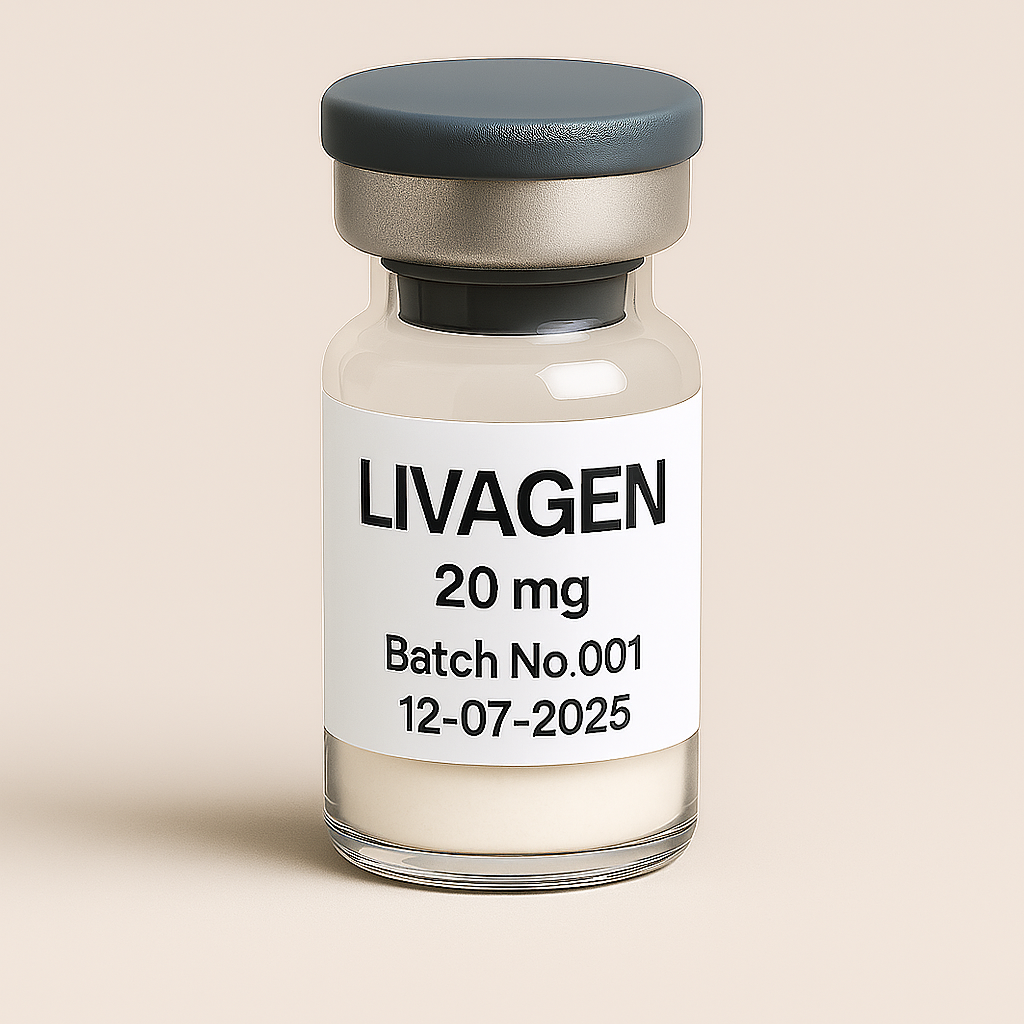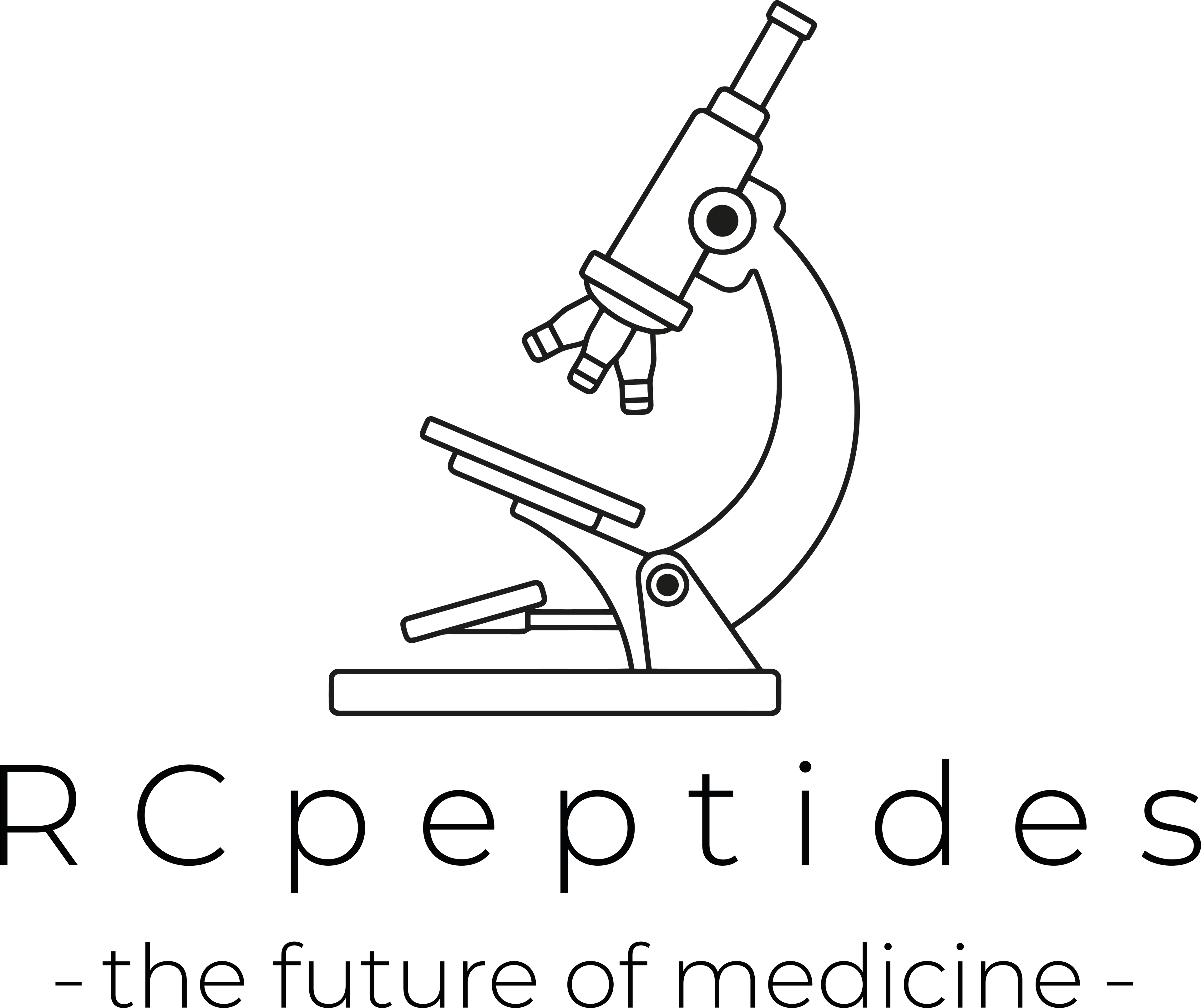
Livagen 20mg vial
Preuzimanje trenutačno nije dostupno
NOT FOR HUMAN CONSUMPTION
Molecular Name: Lysine–Glutamic Acid–Aspartic Acid–Alanine (Lys-Glu-Asp-Ala)
Peptide Classification: Tetrapeptide, short-chain peptide bioregulator
Origin: Developed in Russia by Professor Vladimir Khavinson's group as part of the "Cytogen" peptide series.
1. Scientific Basis and Mechanism of Action
a. Epigenetic Modulation
Livagen is primarily investigated for its epigenetic reprogramming properties in aging cells. In cultured lymphocytes from aged human donors, Livagen has been shown to induce decondensation of heterochromatin, particularly in nucleolar organizer regions. This effect restores the expression of silenced genes, including those associated with ribosome biogenesis and protein synthesis.
This chromatin-modifying action is of particular interest in the context of immunosenescence, as aged immune cells often show diminished gene transcription and translation. Livagen may restore their function by reactivating suppressed genetic loci.
b. Opioid Peptidase Inhibition
Studies from the early 2000s report that Livagen inhibits enzymes responsible for degrading endogenous opioid peptides (enkephalins). This inhibition may increase the levels of these natural opioids in serum, potentially impacting pain regulation, stress resilience, and mood. The inhibitory potency is modest (IC₅₀ ~20 μM), but stronger than that of other Khavinson peptides such as Epitalon.
c. Organ-Specific Gene Expression Normalization
Livagen has been studied for its ability to normalize gene expression profiles in specific organ systems. For instance, in animal models with liver fibrosis or toxin-induced hepatic damage, Livagen administration reportedly increased total liver protein synthesis and antioxidant enzyme activity, suggesting improved hepatocyte function. Other preliminary studies suggest protective effects on the gastrointestinal tract and cardiac tissue, though this evidence remains weak and underreported.
2. Claimed Benefits and Supporting Evidence
| Claimed Benefit | Evidence Source | Quality of Evidence | Comments |
|---|---|---|---|
| Immune rejuvenation | In vitro | Moderate | Demonstrated in aged human lymphocytes; limited functional follow-up. |
| Liver regeneration / hepatoprotection | Animal models | Low to moderate | Increased liver protein synthesis and antioxidant activity reported. |
| Enhanced stress resilience | Theoretical / animal | Low | Based on opioid peptidase inhibition; no direct behavioral studies. |
| Anti-aging effects | Theoretical | Low | Mechanism plausible; clinical validation is absent. |
| GI enzyme normalization | Animal studies | Low | Age-related GI decline modestly reversed in rats. |
Note: Most of these effects are based on preclinical or unpublished Soviet-era research, often in small cohorts or non-randomized studies. Modern, peer-reviewed replication is scarce.
3. Safety Profile and Known Side Effects
a. Preclinical Safety
In rodent studies, Livagen showed no observable toxic effects at low-to-moderate doses. Repeated dosing for up to 30 days did not result in histological or behavioral abnormalities. However, there are no detailed GLP-compliant toxicology reports or chronic exposure studies.
b. Human Anecdotal Reports
On community forums like Reddit (e.g., /r/Peptides), a small number of users have described both positive effects and adverse reactions:
-
One user reported severe anxiety and cardiac palpitations lasting several months after a 12-day protocol.
-
Another noted skin irritation and pruritus following subcutaneous injection.
-
A few users claimed improved mood, stress handling, and energy stability, though these are anecdotal and not linked to any validated biomarkers.
Importantly, there are no large-scale clinical trials confirming safety in humans, and no data on drug-drug interactions, pharmacokinetics, or carcinogenic risk.
4. Dosing and Administration (Research Use Only)
Livagen is sold by research peptide companies typically in powder form (for reconstitution) or in pre-filled pens. The following dosing strategies are mentioned in scientific and promotional materials:
-
Standard protocol (Khavinson lab): 10 mg intramuscularly once daily for 10 days (total dose 100 mg).
-
Modern research peptide vendor guideline: 2 mg subcutaneously daily for 10 days.
-
Oral capsule form (Cytogen Livagen): 0.1 mg per day for 10–30 days (marketed primarily in Russia and Ukraine).
These regimens are not approved or validated by any regulatory authority (FDA, EMA, etc.), and should not be used outside controlled research environments.
5. Comparison with Epitalon and Other Peptides
| Feature | Livagen | Epitalon (AEDG) | Thymogen (Glu-Trp) |
|---|---|---|---|
| Sequence | Lys-Glu-Asp-Ala | Ala-Glu-Asp-Gly | Glu-Trp |
| Primary organ focus | Liver, immune system | Pineal gland, general aging | Immune system |
| Epigenetic modulation | Heterochromatin decompaction | Telomerase activation (speculative) | T-cell modulation |
| Opioid peptidase inhibition | Yes (IC₅₀ ~20 μM) | Weak (~500 μM) | None reported |
| Human trial evidence | Very limited | Slightly more (telomere & sleep studies) | Limited |
Livagen shows more direct evidence of chromatin modification, while Epitalon has been more widely studied for sleep, telomere dynamics, and longevity markers—albeit still in limited trials.
6. Regulatory Status
As of July 2025, Livagen is not approved for therapeutic use by the FDA, EMA, or any equivalent Western medical body. It is sold strictly for laboratory research purposes.
-
No official pharmacopoeia monograph exists.
-
Livagen does not appear on the World Anti-Doping Agency (WADA) prohibited list, but its theoretical gene-modifying effects may fall under “gene expression manipulation” if used in athletic contexts.
-
Its use in humans, outside of research, constitutes off-label and legally ambiguous experimentation.
7. Critical Limitations and Unknowns
-
No pharmacokinetics: The absorption, distribution, metabolism, and elimination of Livagen in humans is entirely unknown.
-
No dose-ranging studies: There is no evidence base for selecting optimal or safe doses.
-
No carcinogenicity or mutagenicity data: Epigenetic modifiers could, in theory, unmask oncogenes.
-
Unknown long-term effects: Especially concerning if taken repeatedly or chronically.
-
Purity concerns: Peptides purchased online may lack GMP certification, and third-party validation is often absent.
8. Final Assessment
Livagen is a theoretically compelling peptide that demonstrates cellular-level rejuvenation effects in vitro and some organ-protective effects in animal models. However:
-
The lack of rigorous clinical data, especially randomized controlled trials, severely limits its medical credibility.
-
Human safety is uncharacterized, and adverse reactions—though rare—may be significant.
-
Mechanistic speculation exceeds clinical reality. Its potential to enhance immune function, prevent aging, or support organ repair remains unproven.

